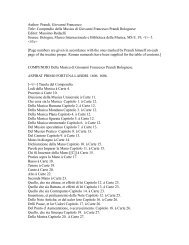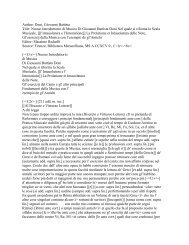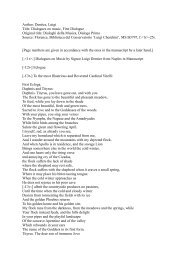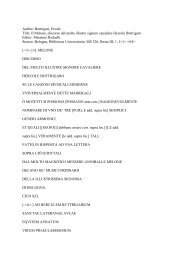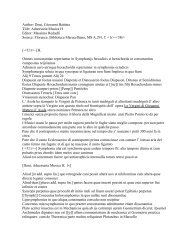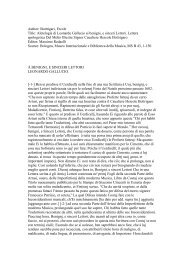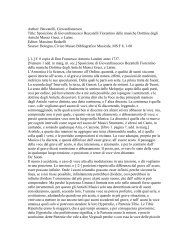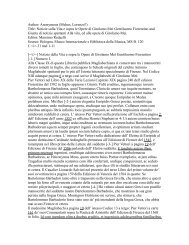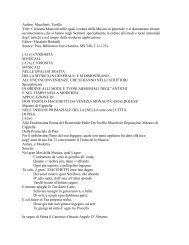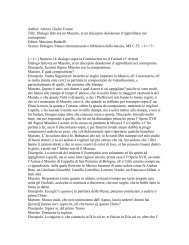Author: Doni, Giovanni Battista - manuscripts of italian music theory ...
Author: Doni, Giovanni Battista - manuscripts of italian music theory ...
Author: Doni, Giovanni Battista - manuscripts of italian music theory ...
Create successful ePaper yourself
Turn your PDF publications into a flip-book with our unique Google optimized e-Paper software.
in the second, and something <strong>of</strong> the Melopoeia in the third one (as this is not the place<br />
to talk about it fully). However, since it will be <strong>of</strong>ten necessary to mention the basic<br />
rules and foundations <strong>of</strong> the ancient theorists, namely, Pythagoras, Aristoxenus and<br />
Ptolemy, it will not be inappropriate to say something about their schools and<br />
opinions before we move on, ad then to carry on with the rest. Since the art and<br />
science <strong>of</strong> <strong>music</strong> had been dealt with by so many different minds and with great<br />
subtlety, it has happened in it what has happened in the other main pr<strong>of</strong>essions, such<br />
as Philosophy, Medicine, and (in Roman times) Law, namely, it has spawned many<br />
and very different schools, each one <strong>of</strong> which had many followers and produced<br />
various published works, which have been consumed and annihilated completed by<br />
time which devours everything, so that we have a record <strong>of</strong> them only in Porphyry's<br />
commentary on Ptolemy. [--] The most important and universally known <strong>of</strong><br />
these were two. One was the Pythagoreans' one, who were mainly philosophers and<br />
were very dedicated to the <strong>music</strong>al speculation, but hardly at all to the practice, and<br />
since they introduced and practised the Canon or Harmonic rule very <strong>of</strong>ten, exercising<br />
themselves all the time in the numbers and in their proportions, they were also called<br />
Canons. [It is also true that Ptolemais <strong>of</strong> Cyrene, as Porphyry states, who wrote an<br />
Introduction to Pythagorean <strong>music</strong>, wanted that they derived the name <strong>of</strong> Canons not<br />
from the Instrument called Canon, but from the straightness <strong>of</strong> the line which they<br />
considered in abstract in their <strong>music</strong>al speculation. in marg.] Their first Teacher was<br />
the famous Pythagoras, very esteemed and honoured by the ancients. The other<br />
School was the one <strong>of</strong> the followers <strong>of</strong> Aristoxenus, otherwise called Harmonics,<br />
because they based their speculation on the simple Harmony without any concern for<br />
the numbers. [They were also called simply Musicians, as Ptolemais herself says add.<br />
supra lin.] Their first founder was not Aristoxenus, since there were some before him<br />
who wrote about <strong>music</strong>, some <strong>of</strong> whom he mentions in his Harmonic Elements, but he<br />
was the most authoritative instead [so much so that Saint Jerome, naming many Greek<br />
authors who wrote lives <strong>of</strong> illustrious men, states that Aristoxenus was the most<br />
learned among them in marg.] and the most lauded writer as he wrote a large number<br />
<strong>of</strong> books on <strong>music</strong>, apart from other works that he wrote about philosophy and other<br />
subjects. Moreover, from what one gathers from the authors who came after him, he<br />
explained and ennobled all the parts <strong>of</strong> <strong>music</strong> with his writings. Aristoxenus was<br />
emulated and competed with Theophrastus, [and, just as he was add. supra lin.] he<br />
was a student and a pupil <strong>of</strong> Aristotle's. They lived both at the same time, which was<br />
during the century <strong>of</strong> Alexander the Great. The main difference that one notices<br />
between these two sects consists [--] in the judgment <strong>of</strong> the intervals and <strong>of</strong> the<br />
sounds, because the Pythagoreans, who in their practice took into account the sense <strong>of</strong><br />
hearing as they were completely intent on it judged that the numbers alone and their<br />
proportions provided the rule to the <strong>music</strong>al intervals and they did not admit any other<br />
consonances than those which are contained in the number six and which have a<br />
multiple or superparticular proportion, rejecting all the superpartient proportions and<br />
the Diapason Diatessaron. This opinion was then completely refuted by Ptolemy.<br />
Therefore, their authority was very important either because <strong>of</strong> the antiquity and<br />
reputation <strong>of</strong> Pythagoras, or because they were the first to speculate around <strong>music</strong>. As<br />
far as we know, their fundamental concepts have been universally embraced, such as<br />
the fact that they do not recognise any other consonances than the Diapason, the<br />
Diapente, the Diatessaron and their compound consonances. In fact, the fact<br />
Aristoxenus himself and his other followers, like Aristides, do not mention<br />
themselves any other consonances is derived more likely from what I have said,<br />
namely, that in many matters they followed the Pythagoras' doctrine and principles,



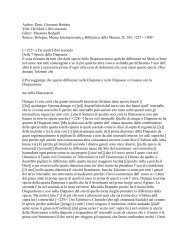
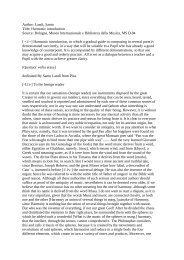
![Doni, Giovanni Battista Title: Trattato Dei Tuoni o [[Harmonie de]]](https://img.yumpu.com/45461005/1/190x245/doni-giovanni-battista-title-trattato-dei-tuoni-o-harmonie-de.jpg?quality=85)
